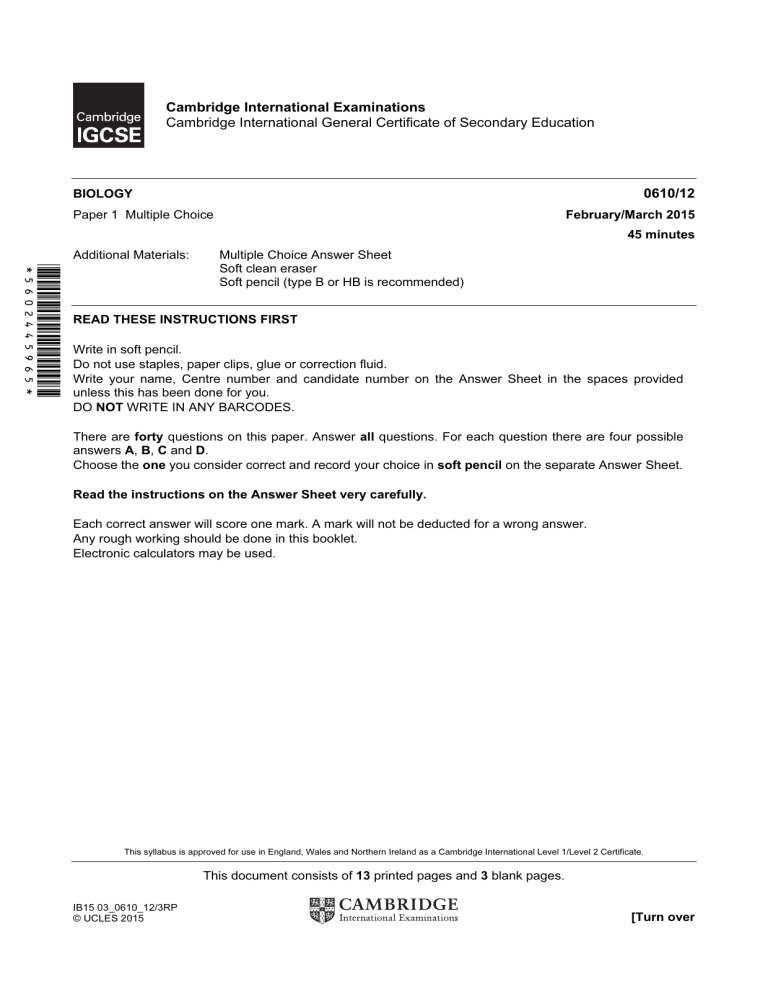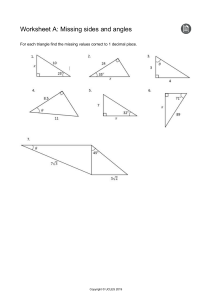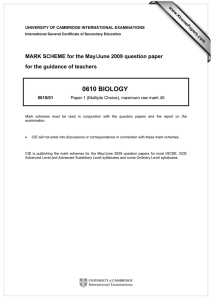
Cambridge International Examinations Cambridge International General Certificate of Secondary Education 0610/12 BIOLOGY Paper 1 Multiple Choice February/March 2015 45 minutes Additional Materials: *5602445965* Multiple Choice Answer Sheet Soft clean eraser Soft pencil (type B or HB is recommended) READ THESE INSTRUCTIONS FIRST Write in soft pencil. Do not use staples, paper clips, glue or correction fluid. Write your name, Centre number and candidate number on the Answer Sheet in the spaces provided unless this has been done for you. DO NOT WRITE IN ANY BARCODES. There are forty questions on this paper. Answer all questions. For each question there are four possible answers A, B, C and D. Choose the one you consider correct and record your choice in soft pencil on the separate Answer Sheet. Read the instructions on the Answer Sheet very carefully. Each correct answer will score one mark. A mark will not be deducted for a wrong answer. Any rough working should be done in this booklet. Electronic calculators may be used. This syllabus is approved for use in England, Wales and Northern Ireland as a Cambridge International Level 1/Level 2 Certificate. This document consists of 13 printed pages and 3 blank pages. IB15 03_0610_12/3RP © UCLES 2015 [Turn over 2 1 2 3 What is not a characteristic of all living organisms? A excretion B photosynthesis C reproduction D respiration Which characteristics do bony fish have? backbone scales hair A B C D The diagram shows an animal whose scientific name is Falco peregrinus. To which species does it belong? A bird B F. peregrinus C Falco D vertebrate © UCLES 2015 0610/12/F/M/15 3 4 Use the key to identify the arthropod shown. 1 body divided into segments .................................... go to 2 body not divided into segments .............................. go to 3 2 body has one pair of legs per segment .................. A body has two pairs of legs per segment ................. B 3 one pair of antennae .............................................. C two pairs of antennae ............................................. D 5 Plant cells are often green but animal cells are not usually green. Which structure in plant cells makes them green? 6 A cell wall B chloroplast C cytoplasm D vacuole The diagram shows the structure of a palisade cell. 3 2 4 1 5 Which features are also found in a liver cell? A 1 and 2 © UCLES 2015 B 2 and 5 C 3 and 4 0610/12/F/M/15 D 4 and 5 [Turn over 4 7 8 9 What are the levels of organisation of the retina and of the eye? retina eye A cell organ B cell organ system C tissue organ D tissue organ system Which cell helps to move dust particles out of an organism? A ciliated cell B guard cell C muscle cell D red blood cell The diagram shows apparatus which can be used to demonstrate osmosis. 1 2 glass tube liquid level very concentrated sucrose solution water concentrated sucrose solution partially permeable membrane After one hour, what would happen to the liquid levels in the glass tubes? level in tube 1 level in tube 2 A falls falls B falls rises C rises falls D rises rises © UCLES 2015 0610/12/F/M/15 5 10 By which process does oxygen pass out of a leaf? A diffusion B osmosis C translocation D transpiration 11 Lactase is a human enzyme that catalyses the breakdown of lactose in milk. At which temperature does lactase work fastest? A 0 °C B 18 °C C 37 °C D 100 °C 12 The graph shows the effect of pH on a particular enzyme-controlled reaction. rate of reaction 1 2 3 4 5 6 7 8 9 10 11 12 13 pH When is the enzyme not active? A at pH 1 and pH 13 B at pH 3 and pH 11 C at pH 5 and pH 9 D at pH 7 13 Which nutrient produces a purple colour when mixed with biuret solution? A fat B protein C reducing sugar D starch © UCLES 2015 0610/12/F/M/15 [Turn over 6 14 What is carried by the xylem? A chlorophyll B mineral ions C starch D sugars 15 The diagram shows the teeth of the lower jaw of a human. Which tooth is an incisor? B C A D 16 What is the correct sequence for blood being pumped from the heart to the lungs? A left atrium → left ventricle → pulmonary artery B left atrium → left ventricle → pulmonary vein C right atrium → right ventricle → pulmonary artery D right atrium → right ventricle → pulmonary vein 17 Which structures in plants and in humans normally carry amino acids? arteries phloem ureters A B C D © UCLES 2015 0610/12/F/M/15 7 18 Why is the circulatory system of mammals described as a double circulation? A Blood flows firstly through arteries and then through veins. B Blood flows through the heart twice on one complete circuit of the body. C In the heart, blood flows firstly through atria and then through ventricles. D The atria and the ventricles contract alternately. 19 Which word equation represents anaerobic respiration in human muscle? A glucose → carbon dioxide + ethanol (alcohol) B glucose → carbon dioxide + lactic acid C glucose → ethanol (alcohol) D glucose → lactic acid 20 A woman has been smoking heavily for many years. Which statement could not be correct? A Her arteries are blocked with tar. B She is addicted to nicotine. C The cilia in the trachea have been destroyed. D The surface area of the lungs is reduced. 21 What makes alveoli suitable as a gas exchange surface? large total surface area well-supplied with blood vessels A B C D 22 How is urea removed from the body? A as insoluble waste B by being destroyed in the liver C in expired air D in solution © UCLES 2015 0610/12/F/M/15 [Turn over 8 23 How does blood change as it passes through a kidney? A It gains glucose. B It gains salts. C It loses protein. D It loses urea. 24 What would be the effects of vasodilation and sweating on the body temperature and on the amount of moisture on the surface of the skin? body temperature moisture on skin surface A decreased decreased B decreased increased C increased decreased D increased increased 25 What would be the pupil size and lens shape of a person reading a mobile phone text message in a brightly-lit room? pupil size lens shape A large fat B large thin C small fat D small thin © UCLES 2015 0610/12/F/M/15 9 26 The graphs show changes that occur in a woman during the menstrual cycle. thickness of uterus lining progesterone blood hormone concentration oestrogen 0 7 14 21 28 time / days Which statement is supported by evidence in the graphs? A A large increase in progesterone concentration always results in thickening of the uterus lining. B At ovulation, the uterus lining is at its thickest. C Each time the oestrogen concentration rises, the uterus lining becomes thicker. D Within 5 days of ovulation, the uterus lining gets thinner. 27 The diagram shows a developing fetus attached to the uterus of a pregnant woman. Which part is normally cut immediately after birth? B A C D 28 Which environmental condition is not essential for the germination of all seeds? A availability of light B availability of oxygen C availability of water D suitable temperature © UCLES 2015 0610/12/F/M/15 [Turn over 10 29 What always increases during the development of an organism? A cell number B complexity C dry mass D volume 30 What is an example of a characteristic that shows discontinuous variation in humans? A blood group B body mass C height D width of hand 31 What are the sex chromosomes for human females and males? female male A XX XY B XX YY C XY XX D YY XY 32 In fruit flies, the allele for grey body, G, is dominant over the allele for black body, g. The result of a mating between two flies is shown. (parents) grey-bodied fly × black-bodied fly (offspring) 33 grey-bodied flies + 38 black-bodied flies What were the genotypes of the parents? A Gg × gg B Gg × Gg C GG × gg 33 Which way does energy flow directly in a food chain? A carnivore to herbivore B consumer to producer C decomposer to producer D producer to herbivore © UCLES 2015 0610/12/F/M/15 D GG × Gg 11 34 The diagram shows a food web. leopard baboon impala scorpion locust grass At which trophic levels is the leopard feeding? A first and second B second and third C second and fourth D third and fifth 35 The graph shows changes in biomass of different organisms in an ecosystem over a 12 month period. Each line represents a different trophic level. Which line represents the herbivores? A biomass of organisms B C D January April August December month © UCLES 2015 0610/12/F/M/15 [Turn over 12 36 Which processes result in organisms gaining carbon compounds, and in the addition of carbon dioxide to the atmosphere? organisms gaining carbon compounds addition of carbon dioxide to the atmosphere A photosynthesis and combustion respiration by animals B photosynthesis and combustion respiration by plants C photosynthesis and feeding dead organisms changing to fossil fuels D photosynthesis and feeding respiration by plants 37 The diagram shows part of the water cycle. Where is osmosis occurring? clouds A B water vapour D C plants lake © UCLES 2015 0610/12/F/M/15 soil 13 38 The graph shows how the population of the world increased from 1650 until the present day. 8 7 6 5 world population (billions) 4 3 2 1 0 1700 1800 1900 year Which phases of the usual sigmoid growth curve are missing in this graph? A death and lag B exponential (log) and stationary C lag and exponential (log) D stationary and death 39 Which process may result in eutrophication in a lake? A bleach entering from a factory B fertilisers entering from farmland C hot water entering from a power station D pesticides entering from farmland 40 Which two gases are the biggest contributors to the greenhouse effect? A carbon dioxide and methane B carbon monoxide and carbon dioxide C methane and sulfur dioxide D sulfur dioxide and carbon monoxide © UCLES 2015 0610/12/F/M/15 2000 14 BLANK PAGE © UCLES 2015 0610/12/F/M/15 15 BLANK PAGE © UCLES 2015 0610/12/F/M/15 16 BLANK PAGE Permission to reproduce items where third-party owned material protected by copyright is included has been sought and cleared where possible. Every reasonable effort has been made by the publisher (UCLES) to trace copyright holders, but if any items requiring clearance have unwittingly been included, the publisher will be pleased to make amends at the earliest possible opportunity. To avoid the issue of disclosure of answer-related information to candidates, all copyright acknowledgements are reproduced online in the Cambridge International Examinations Copyright Acknowledgements Booklet. This is produced for each series of examinations and is freely available to download at www.cie.org.uk after the live examination series. Cambridge International Examinations is part of the Cambridge Assessment Group. Cambridge Assessment is the brand name of University of Cambridge Local Examinations Syndicate (UCLES), which is itself a department of the University of Cambridge. © UCLES 2015 0610/12/F/M/15





